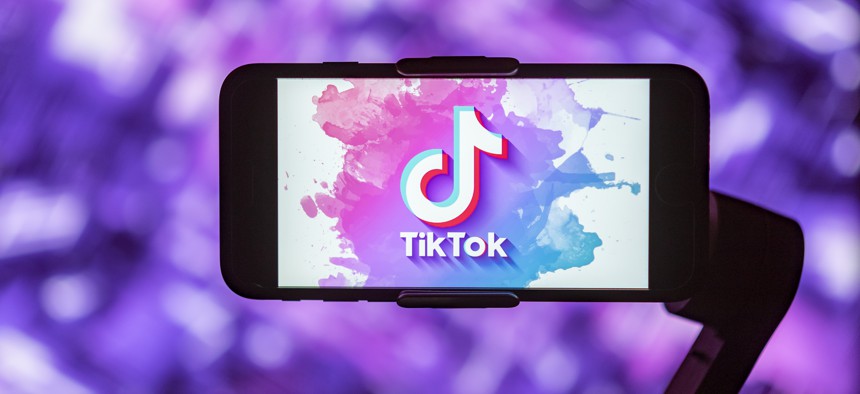
SOPA Images /Getty
Lawmakers Intro Bill to Ban TikTok in U.S.
TikTok poses a national security threat, according to lawmakers on both sides of the political aisle.
Sen. Marco Rubio, R-FL., on Tuesday introduced bipartisan legislation that would ban the popular app TikTok from operating within the United States over national security concerns.
Rubio’s bill—the Averting the National Threat of Internet Surveillance, Oppressive Censorship and Influence, and Algorithmic Learning by the Chinese Communist Party, or ANTI-SOCIAL CCP Act—already has bipartisan support in the House, with Reps. Mike Gallagher, R-Wis., and Raja Krishnamoorthi, D-Ill., authoring companion legislation.
“The federal government has yet to take a single meaningful action to protect American users from the threat of TikTok,” Rubio said in a statement. “This isn’t about creative videos—this is about an app that is collecting data on tens of millions of American children and adults every day. We know it’s used to manipulate feeds and influence elections. We know it answers to the People’s Republic of China. There is no more time to waste on meaningless negotiations with a CCP-puppet company. It is time to ban Beijing-controlled TikTok for good.”
TikTok is owned by Chinese parent company ByteDance. Numerous federal officials, including FBI Director Chris Wray, have testified that the Chinese Communist Party has authority over all Chinese companies, which “allows them to manipulate content, and if they want to, to use it for influence operations.”
“At a time when the Chinese Communist Party and our other adversaries abroad are seeking any advantage they can find against the United States through espionage and mass surveillance, it is imperative that we do not allow hostile powers to potentially control social media networks that could be easily weaponized against us,” Krishnamoorthi said in a statement..
This year, TikTok overtook Google as the most popular website in the world, despite concerns over the app’s ability to track users. Because of its connections to China, several federal agencies have banned the use of the video application over security concerns, and Congress has pressed the company’s leaders about the spread of extreme content on its platform. Recently, several states moved to ban TikTok from state agencies and employees that use work devices.
TikTok, however, contends lawmaker concerns are not rooted in fact.
In Sept. 14 testimony before the Senate Homeland Security and Governmental Affairs Committee, TikTok Chief Operating Officer Vanessa Pappas said the Chinese government exercises influence over TikTok “in no way, shape or form.” Lawmakers, however, aren’t buying it.
“TikTok is digital fentanyl that’s addicting Americans, collecting troves of their data and censoring their news,” Gallagher said. “Allowing the app to continue to operate in the U.S. would be like allowing the U.S.S.R. to buy up the New York Times, Washington Post and major broadcast networks during the Cold War. No country with even a passing interest in its own security would allow this to happen, which is why it’s time to ban TikTok and any other CCP-controlled app before it’s too late.”
TikTok is currently in negotiations with the Committee on Foreign Investment in the United States over such national security concerns.







